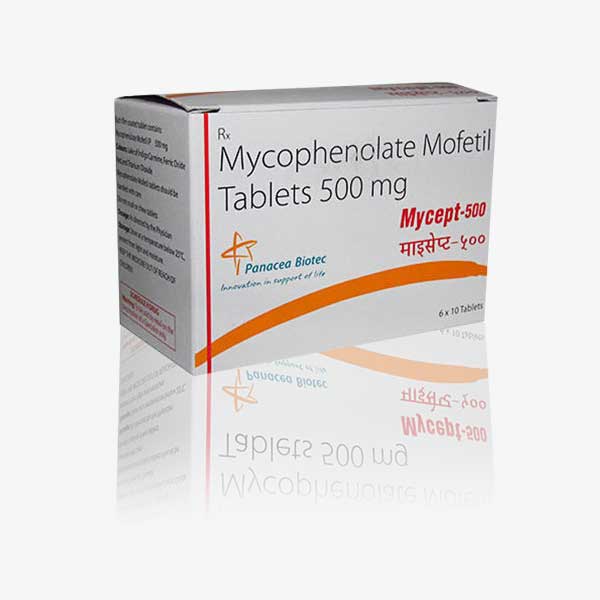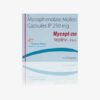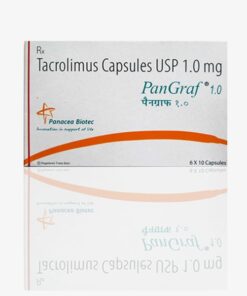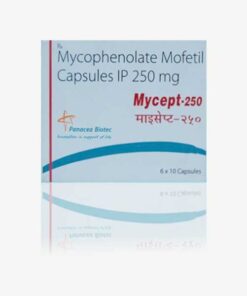Buy Mycept : Mycophenolate 500 mg Tablets 60’S Online
$63.77
Brand Name : Mycept
Composition : Mycophenolate Mofetil
Manufactured by : Panacea Biotec Ltd.
Strength : 500mg
Form : Tablet
Packing : Pack of 60 Tablets
Prescription Required *
Mycept is a brand name for the generic drug Mycophenolate Mofetil. It belongs to a class of medications called immunosuppressants. It is used to prevent organ rejection in patients who have received kidney, liver, or heart transplants. It works by suppressing the immune system, which helps to prevent the body from rejecting the transplanted organ.
Uses:
Mycept is primarily used to prevent organ rejection following kidney, liver, or heart transplantation. It is given to patients who have received a transplant to ensure that their body does not reject the transplanted organ. Mycept is usually prescribed in combination with other medications.
HOW TO USE:
Mycept should be taken orally, usually twice daily, with or without food. The tablets should be swallowed whole, not crushed or chewed. It is important to take Mycept at the same time(s) every day to ensure that the medication is effective.
Storage Conditions:
Mycept tablets should be stored at room temperature, away from heat and moisture. They should be kept out of the reach of children and pets.
Mechanism of Action:
Mycept works by suppressing the immune system, which helps to prevent the body from rejecting a transplanted organ. It does this by inhibiting the production of certain white blood cells that are responsible for attacking foreign substances in the body, such as transplanted organs. By suppressing the immune system, Mycept helps to ensure that the transplanted organ is not attacked and rejected by the body.
Precautions:
Before taking Mycept, it is important to tell your doctor if you have any allergies or medical conditions. Mycept can increase your risk of infections and may lower your body’s ability to fight infections. It is important to avoid contact with people who have infections while taking Mycept.
Contraindications:
Mycept is contraindicated in patients who are allergic to Mycophenolate Mofetil or any of its ingredients. It should not be taken by pregnant women, as it can harm the developing fetus. It should also not be taken by patients with severe liver or kidney disease.
Drug Interactions:
Mycept can interact with several other medications, including antacids, antibiotics, and antiviral medications. Patients should tell their doctor about all the medications they are taking before starting Mycept.
Overdose:
In case of an overdose of Mycept, seek medical attention right away. Symptoms of an overdose may include diarrhea, vomiting, and stomach pain.
Side Effects:
The most commonly reported side effects of Mycept include diarrhea, nausea, vomiting, and stomach pain. Less common side effects may include headache, dizziness, and difficulty sleeping. Mycept can also increase the risk of infections, as it suppresses the immune system. Some serious side effects that require immediate medical attention include allergic reactions, severe skin reactions, and signs of liver or kidney damage.
Be the first to review “Buy Mycept : Mycophenolate 500 mg Tablets 60’S Online” Cancel reply
Related products
Immunosuppressive Drugs
Buy Sandimmun Neoral : Cyclosporine 50 mg Capsules 50’S Online
Immunosuppressive Drugs
Buy Sandimmun Neoral : Cyclosporine 100 mg Capsules 50’S Online
Immunosuppressive Drugs
Immunosuppressive Drugs
Immunosuppressive Drugs
Buy Pangraf : Tacrolimus 0.5 mg Capsules 60’S Online For Sale










Reviews
There are no reviews yet.